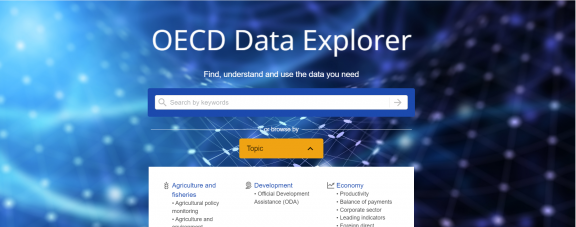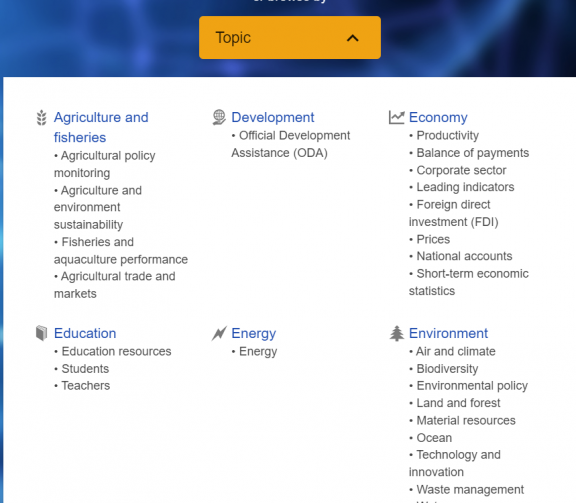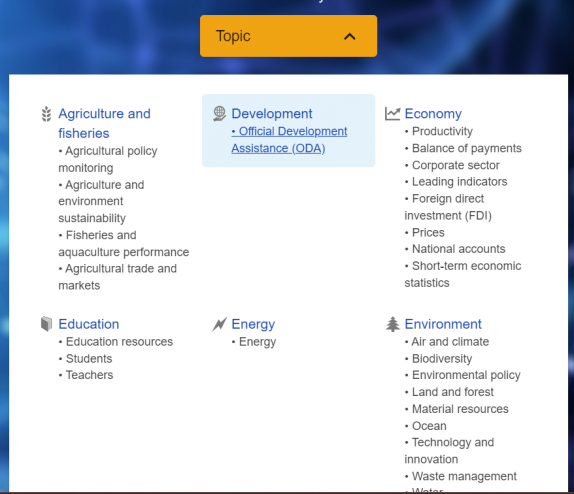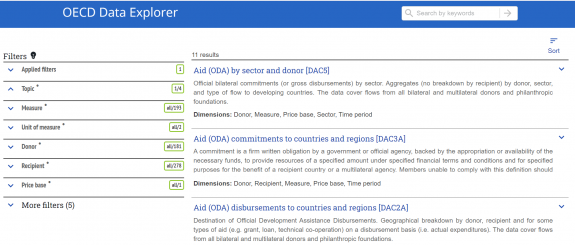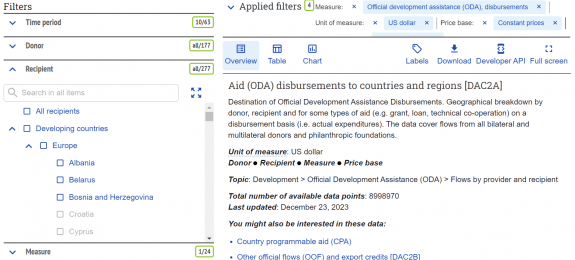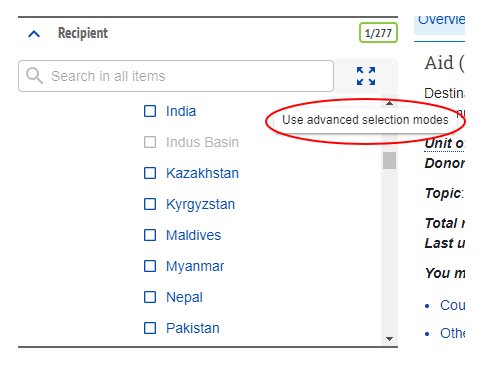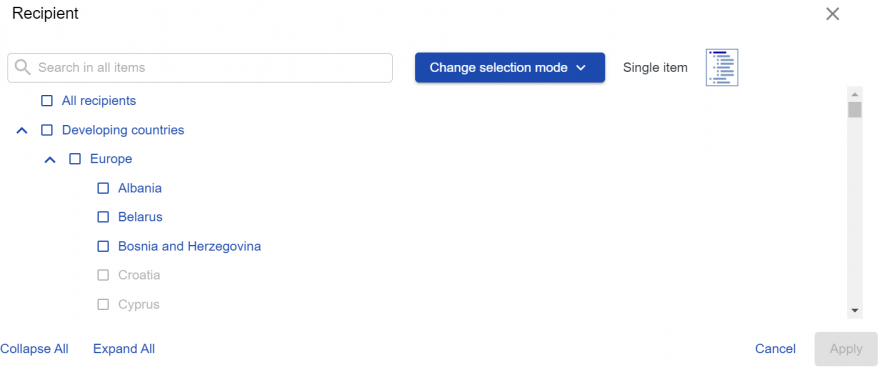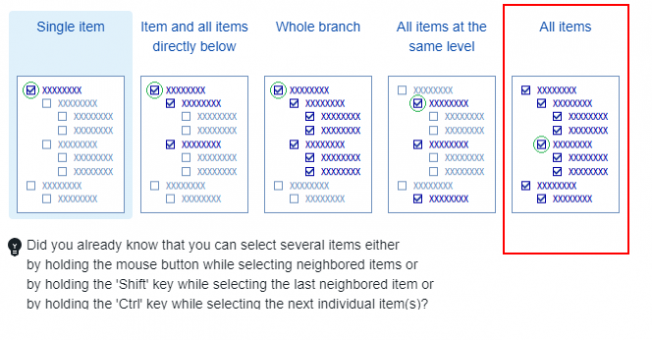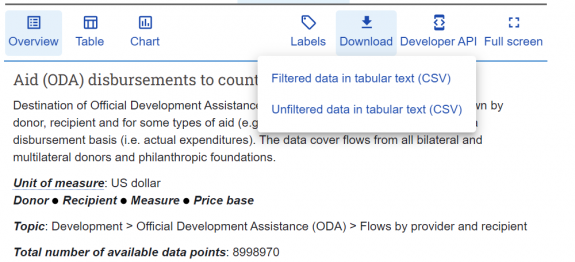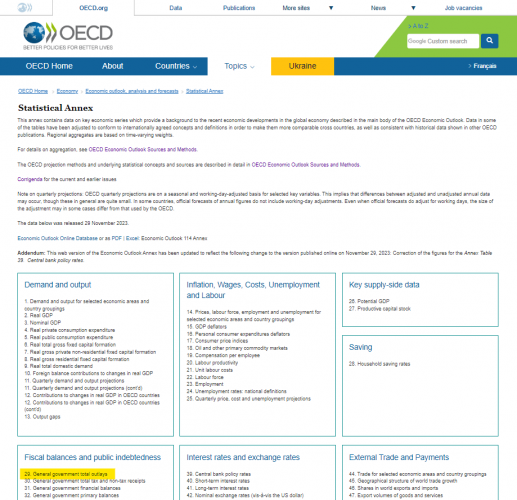OECD The Organisation for Economic Co-operation and Development
SUMMARY
OECD Data Explorer (Old version: OECD.Stat) is the Organisation for Economic Co-operation and Development’s database, housing data on a variety of indicators, including those on agriculture, development, labor, and international trade. OECD Data Explorer collects data on both member and non-member countries for indicators on development, agriculture, education, and a myriad of addition economic variables. (OECD.Stat has reached the end of its life and will be switched-off end of March 2024.)
To pull data, please follow the instructions below.
GENERAL STEPS TO PULL DATA FROM OECD Data Explorer
Step 1.) Navigate to the home page of OECD Data Explorer
Step 2.) Choose one of the themes below pick a topic area
Step 3.) Select a sub theme within your selected theme (e.g. Offical Development Assistance (ODA))
Step 4.) Select an indicator within that sub theme (e.g. Aid (ODA) disbursements to countries and regions [DAC2A])
Step 5.) Once you have selected an indicator, you can use "Filters" on the left to select which countries you would like to see data on, or other customization options (e.g. "Recipient" is the country option for Aid (ODA) disbursements to countries and regions [DAC2A])
Step 5.1) To change the selection mode to select all countries easily, you need to "Use advanced selection modes".
Step 5.2) Select Change selection mode
Step 5.3) Select the mode you prefer (e.g. All items). Then click any of the countries, it will automatically select all. Then, Apply.
Step 6.) Hover over “Download” and select to download "Filtered data in tabular text (CSV)".
Data by Topic
Development
Offical Development Assistance (ODA)
Flows by donor (ODA+OOF+Private) [DAC1]
- Official and Private Flows - Disbursements and Commitments. Aggregate data (no breakdown by recipient) on ODA, OOF, private and NGO data by donor, type of aid and flow. The data cover flows from DAC member countries, EU Institutions and non-DAC providers.
- Definition of Net ODA: Official development assistance (ODA) is defined as government aid designed to promote the economic development and welfare of developing countries. Loans and credits for military purposes are excluded. The OECD maintains a list of developing countries and territories; only aid to these countries counts as ODA. The list is periodically updated and currently contains over 150 countries or territories (see DAC List of ODA Recipients: https://oe.cd/dac-list ). Prior to 2018, the ODA flows basis methodology covered loans expressed on a “cash basis”, meaning their full face value was included, then repayments were subtracted as they came in. From 2018, the ODA grant-equivalent methodology is used whereby only the “grant portion” of the loan, i.e. the amount “given” by lending below market rates, counts as ODA. This indicator is measured as a percentage of gross national income and million USD constant prices, using 2021 as the base year. (From: https://data.oecd.org/oda/net-oda.htm)
AidDon%GNI:
- Time Period: 1960 – 2022
- Donor: DAC countries (Whole Branch)
- Measure: ODA as percent of GNI, grant equivalent & ODA as percent of GNI, net disbursements
- Flow type: Disbursements, net & Grant equivalents
- Unit of measure: Percentage of gross national income
- Price base: Unselect Constant prices (Note: Change it first, if the default selection limit the selection on Measure)
Aid (ODA) disbursements to countries and regions [DAC2A]
- Destination of Official Development Assistance Disbursements. Geographical breakdown by donor, recipient and for some types of aid (e.g. grant, loan, technical co-operation) on a disbursement basis (i.e. actual expenditures). The data cover flows from all bilateral and multilateral donors and philanthropic foundations.
AidRec%GNIOECD, AidRecGrants%GNI, AidRecLoanGross%GNI, AidRecLoanNet%GNI, AidRecLoanRepay%GNI, AidRecRecover%GNI
- Unit: Millions (to calculate the series, need to *1000000)
- Unit of measure: US dollar
- Use the values from OECD to be divided by GNI (Current US$): https://data.worldbank.org/indicator/NY.GNP.MKTP.CD API_NY.GNP.MKTP.CD_DS2_en_csv_v2_3145: Data in Current US$
| Variable | Time Period | Donor | Recipient | Measure | Price base |
| AidRec%GNIOECD | 1960-2022 | Official donors | All Developing Countries | Official development assistance (ODA), disbursements | Current prices |
| AidRecGrants%GNI | 1960-2022 | Official donors | All Developing Countries | ODA grants, disbursements | Current prices |
| AidRecLoanGross%GNI | 1960-2022 | Official donors | All Developing Countries | Gross ODA Loans | Current prices |
| AidRecLoanNet%GNI | 1960-2022 | Official donors | All Developing Countries | ODA Loans, net disbursements | Current prices |
| AidRecLoanRepay%GNI | 1960-2022 | Official donors | All Developing Countries | ODA Loans, repayments | Current prices |
| AidRecRecover%GNI | 2004-2022 | Official donors | All Developing Countries | Recoveries on grants | Current prices |
Note: Yemen (1990-2022) received ODA more than GNI
Economy
National accounts -> GDP and non-financial accounts -> Production, employment and investment
Annual value added and its components by economic activity
- This table presents gross value added by economic activity based on detailed breakdowns of Revision 4 of the International Standard Industrial Classification of All Economic Activities (ISIC).
- ICT identified by ISIC REV.4: ICT value added is the difference between the Information and Communication Technology sector gross output and intermediate consumption. The aggregate of information industries here includes ISIC rev. 4 Division 26 (Manufacture of computer, electronic and optical products) and Section J (Information and communication). (From: https://data.oecd.org/ict/ict-value-added.htm)
VaddICT%GDP:
- Time Period: 1950 – 2023
- Reference area: All
- Transaction: Value added, gross
- Economic activity: Manufacture of computer, electronic and optical products & Information and communication
- Unit of measure: National currency
- Price base: Current prices
- Downloaded data is in Millions (to calculate the series, need to *1000000)
- GDP(current Local Currency (LCU)): https://data.worldbank.org/indicator/NY.GDP.MKTP.CN
- API_NY.GDP.MKTP.CN_DS2_en_excel_v2_70: Data in Current local currency.
- Value Added by ICT divided by GDP (LCU)
Statistical Annex
Fiscal balances and public indebtedness
Table 29 General government total outlays
GovTotalOutlays%GDP
- Click Fiscal balances and public indebtedness. (Download File: EO114_Fiscal-balances-and-Public-Indebteness.xlsx)
- Use Tab: ‘Total Outlays’
- The current series in IFs goes from 1993 to 2017. This was a simple update that replaced 2010-2017 with more refined and current data and added 2018-2025 forecasts to the series.
